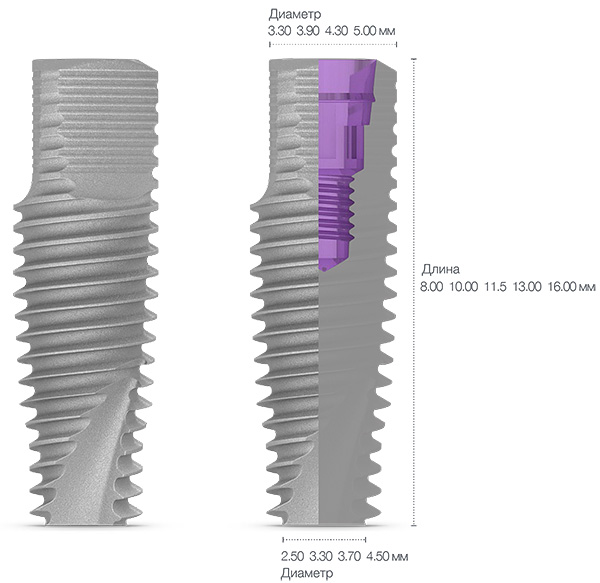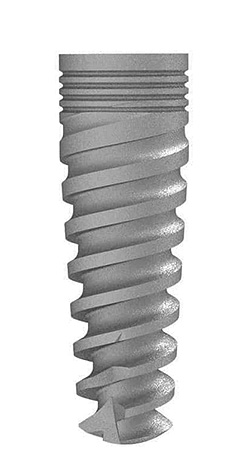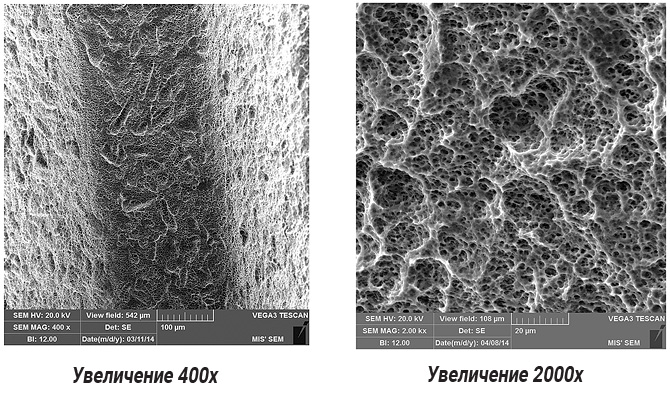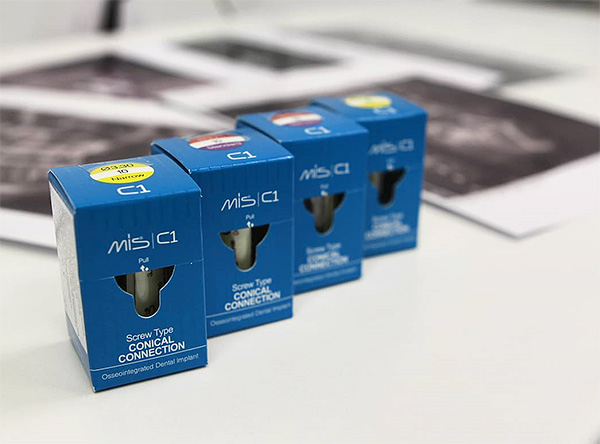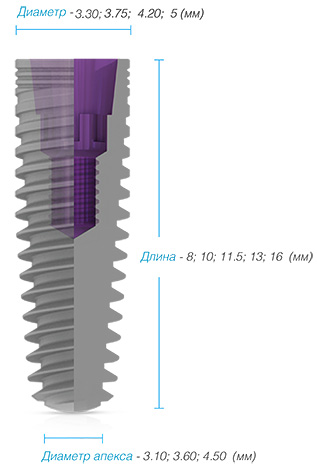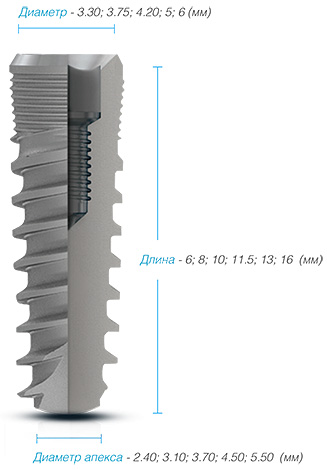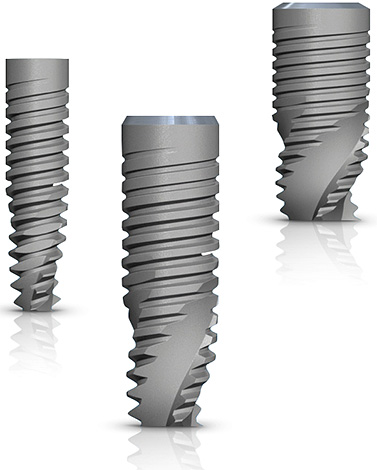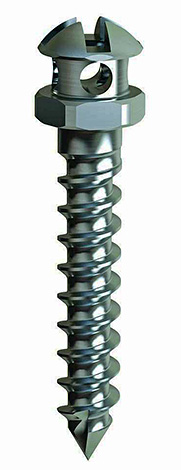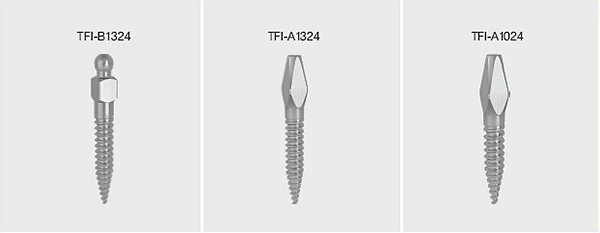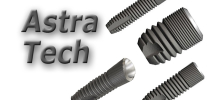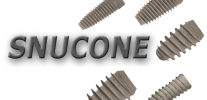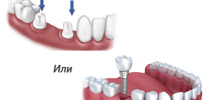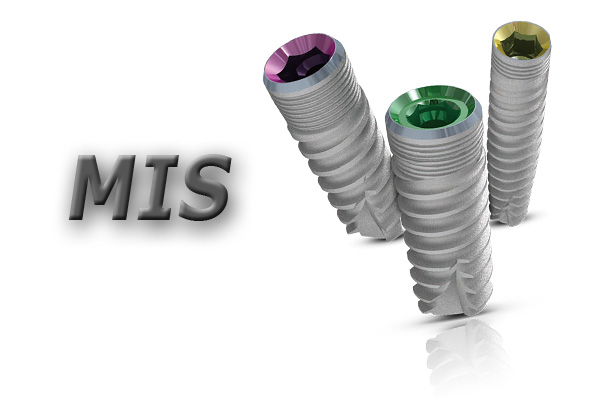
When it becomes necessary to prosthetics one or several teeth on implants, the patient always faces a difficult choice - which implant to prefer, because today at least a couple of dozen brands are on the market. Russian, korean, Israeli, German, swedish - for 10, 30, 80 thousand rubles ...
Next, we will talk about one of the most popular systems of dental implantation - MIS of the Israeli company Medical Implant Technologies. A distinctive feature of MIS implants is a very affordable price, which in many respects determined the brand's popularity among patients (and doctors) in Russia.
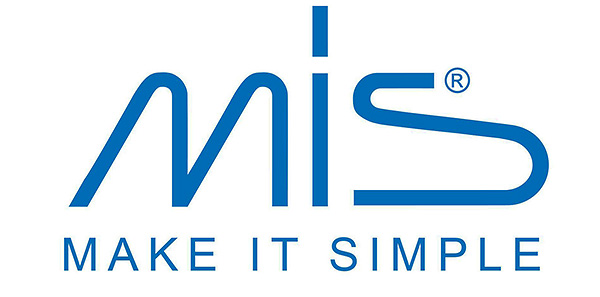
But do these implants have any more significant advantages than just a low price? And is it worth installing them at all, or is the low price in this case associated with a high risk of implant rejection and the development of other complications?
Let's figure it out ...
A few words about the manufacturer
The company Medical Implants Technologies (MTS), which manufactures MIS implants, is based in Israel, but components for implant treatment are also being developed at factories in France and Germany. Today, more than one million MIS implants are created annually, using state-of-the-art robotic equipment.
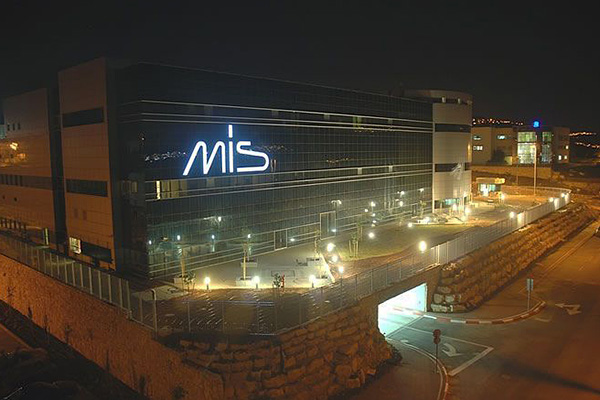
A dental clinic can buy MIS implants only from official representatives (in the Russian Federation, one of the main companies is “Liment”, which has a dealer network in almost the entire country). For uninitiated people, this does not mean much, but in reality it is a weighty argument in favor of the Israeli company, since the patient in this case is quite reliably protected from the appearance of a fake implant of doubtful quality in his mouth (yes, there are some on the market).
It is also worth noting that the company's products are located on the Russian market legally - there are all the necessary certificates and registration certificates. The manufacturer has also obtained certificates of product compliance with the quality standards of the European Union and the USA - ISO and FDA (MIS implants are used in many European countries, as well as in the USA).
Technological advantages of MIS implants
Now let's see what technological solutions are embedded in the design of MIS implants, because it is their combination that in many respects distinguishes a dental implant from a conventional metal (titanium) self-tapping screw.
On a note
In the advertising materials of implants of different brands, even relatively insignificant differences from competitive products are often sung as revolutionary know-how. Next, we will try to describe the characteristics of MIS implants primarily in terms of the benefits that they really give the patient.
- Conical or cylindroconic root shape. In other words, such implants have an anatomical shape, like the root of a natural tooth. This is important in terms of the uniform distribution of the load on the bone and for successful osseointegration. At the same time, this form is not something unique, and is used in most other implant systems - both economy class and premium implants;

- Double thread (well pronounced, for example, with MIS Seven implants). This technology is a significant plus. It provides an effect of sufficient compression of the bone tissue in the depths of the hole (that is, during installation, the bone is compressed, forming a dense layer around the implant), and at the same time, micro threading in the marginal bone area (near the gums) prevents bone atrophy in this area over time . Simply put, the implant will be sufficiently firmly held in the bone immediately after installation, and the effect of gum subsidence in the area of the installed implant will be minimized over time;

- Titanium alloy instead of pure titanium. It should be borne in mind that this is rather a minus than a plus.On the one hand, this can significantly reduce implant cost and make them stronger. On the other hand, according to a number of studies, this may affect the probability of implant rejection and cause allergic reactions. Premium implants are made from more expensive pure titanium - and that says a lot;
- Rough surface. Not so long ago, this was a novelty, however, today almost all firms produce classic dental implants with a porous surface (the products undergo sandblasting with high pressure abrasives or acid etching, or both types of treatment in series). As a result, micropores are present in the titanium surface of the implant, into which the growing cells of the jawbone penetrate - over time, the implant and the bone become one.

On a note
In March 2015, an independent study of the implant surfaces of 62 manufacturers was published in the EDI Journal. Interestingly, for a long time there was no single standard in accordance with which such an assessment could be carried out. But it is the external part of the structures that contacts the bone, and its pollution significantly increases the risk of tissue infection.
According to the research, many well-known companies (Nobel, Straumann, Friadent, Dentium) found microparticles of sulfates and silicon on the surface. Implants of brands such as MIS (evaluated by the SEVEN line), AstraTech were clean - no contamination was found on their surface.
Researchers note that chemical changes are not intentional, they occur during the final stage of treatment (jet or acid), but may increase the risk of peri-implantitis and implant rejection.
- Individual packing. Each MIS implant is placed in a protective flask and box with a convenient tear-off tab for prompt opening during surgery. This is a rather significant point, because it is important for the doctor to open the package for the patient, since this is a guarantee of the sterility of the product and the fact that the Israeli implant chosen by the patient will be installed, and not a “no name product”. The presence of a serial number is also important - it must be indicated on the patient’s card, which protects against counterfeit products and allows you to turn to the company for the fulfillment of warranty obligations in the future;

Among the technological features of implants, MIS is also noteworthy for the presence of various types of implant and abutment connections (i.e., the apex on which the prosthesis is fixed). There are two types of implant and abutment connections in the Israeli MIS system:
- conical connection
- connection "internal hexagon".
The use of both types of compounds of elements is justified and actively used by some other manufacturers of implants.
A conical connection is more expensive. The lower part of the abutment is made in the form of a cone, inside the implant there is a similar recess in shape. The connection occurs due to the forceful introduction of the abutment and its jamming on the implant platform. If you conduct an experiment outside the oral cavity - just place the abutment in the implant and turn the structure over, then all the elements should remain in place.
Among the advantages of a conical connection:
- the absence of gaps between the elements, which reduces the risk of secondary infection and penetration of bacteria into the microcrack;
- the presence of a narrow “body” of the abutment, which allows restoration of even the front teeth where aesthetics are most important (the crown will fit snugly against the gum).
Among the minuses - sometimes there are difficulties with prosthetics (however, this does not affect the patient - the orthopedist and dental technician will have to work hard).
A hexagon connection is more common. It is very easy to use and suitable for fastening any prosthesis.Among the minuses is the average level of tightness, because of which food debris and bacteria can get into micro-gaps.
As for the MIS implants themselves, there are several dozen modifications in the catalog of them, for almost any clinical case. For classic implantation, one-stage installation simultaneously with tooth extraction, orthodontic (for additional fixation of braces) and temporary implants. Thus, indications for treatment are the absence of one, several teeth, all teeth of the jaw, the presence of a narrow and loose bone, the need to restore teeth immediately after removal, prosthetics removable or permanent dentures.
Next, we consider what MIS implants can be found in Russian clinics today.
MIS implant line
So, in the line of implants MIS there are the following models:
- C1 - a modern root-shaped implant with a conical connection of the implant and the abutment. It is applied when classical two-stage implantationas well as during implantation with immediate loading;

- Seven - universal MIS root-shaped dental implants with double thread, which improves bone compression during installation, as well as with micro-threads (rings) at the apex, which contributes to the long-term preservation of bone volumes in the gingival region. They are used for almost all types of bone. Have a connection to the abutment in the form of a hexagon;

- M4 BioCom is an implant that has parallel walls to the middle and tapers to the lower apical part. The base is flat, which allows you to adjust the position of the implant directly during installation. M4 BioCom implants are used for any bone density, although they are more suitable for installation in soft bone;

- Uno single-piece implants are MIS integral thin implants in which the intraosseous part is inseparable from the abutment. They are used for both classical and implantation simultaneously with tooth extraction. Suitable for immediate loading (provided primary stability of the implant is achieved). Ideal for narrow spaces bounded by adjacent teeth, as well as for prosthetics of the front teeth;

- Link orthodontic implants are small implants that are placed on the side. They are necessary for additional tension and fastening of bracket systems during bite correction;

- MIS Temporary Implants - without cuts and seams are installed in the bone, necessary for the period of implantation of permanent implants to support temporary removable dentures.

All of these implant models have various typical shapes, that is, they are suitable for short, normal or excessively narrow bones. From the point of view of an implantologist, a wide range of products is good, because when a difficult clinical situation arises, it will not be necessary to turn to implants of another company, treatment can be carried out using the means of one implantation system.
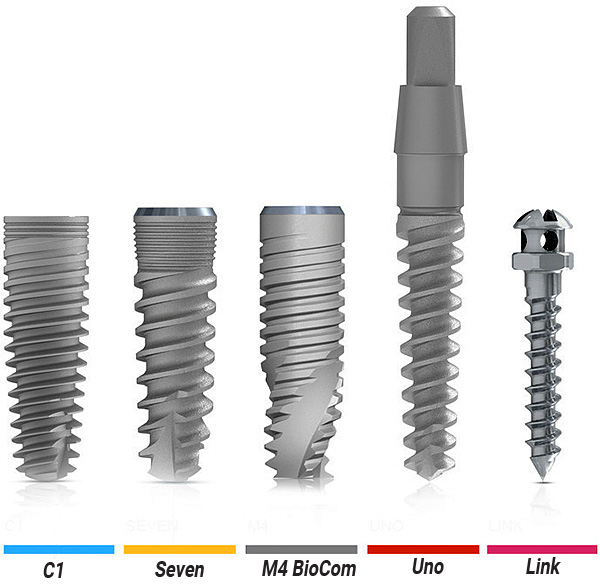
It is also worth noting that Medical Implant Technologies is not limited to the development of exclusively implants. The Israeli company produces a fairly wide range of products - these are not only MIS implants, but also osteoplastic materials (protective membranes and artificial bone for building), abutments (temporary, permanent, for removable and non-removable prostheses), caps for implants, surgical instruments for implantation.
On a note
Before starting work with MIS products, dentists undergo compulsory training from company representatives, after which they receive an appropriate certificate. For the patient, this is one of the guarantees that dental implants will be successful and without complications, because the doctor will be expertly savvy.
See also article Complications and problems sometimes arising after dental implants.
Implant Engraftment: Statistics
To determine the percentage of engraftment of Israeli implants, more than one study was conducted.Moreover, both within the company (the company, of course, is interested in improving the quality of its products and identifying emerging problems), and independent. The average result of the engraftment of MIS implants is about 97%, and if the patient has periodontitis – 88%.
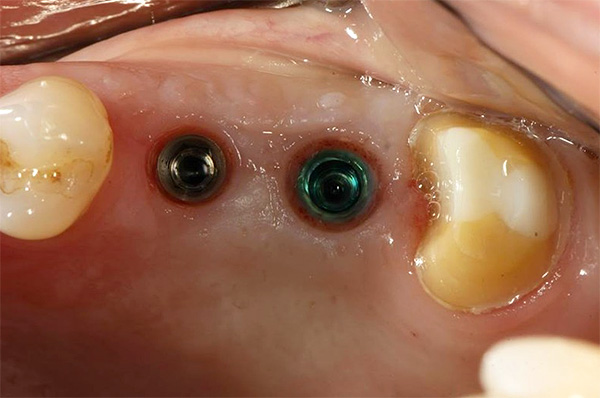
The following are some examples.
The first study (duration - 5 years): 1954 patients underwent MIS implants (a total of 7340 units). All participants underwent an X-ray examination six months after the operation or earlier, if the patient smoked, suffered from bruxism (strong jaw compression, usually at night) or he has signs of peri-implantitis, that is, inflammation of the bone around the implant.
Results: the percentage of engraftment is 99.7%. In the early years, 21 implants were rejected, after the installation of prostheses - another 18 pieces.
The second study (over 4 years): the MIS SEVEN implants (294 pcs.), Which were installed in 92 patients aged 27 to 71 years, were evaluated. Most had a lack of bone tissue, its implantation was carried out simultaneously with the installation of implants. After engraftment of the structures (after 3-4 months on the lower and 5-7 months on the upper jaw), prostheses were installed - single crowns, partial or full dentures.
Results: the implant survival rate was 97.3%. In the first two years after installation, only 8 structures were removed, and subsequently no tears were recorded.
It is interesting
In the second study, the relationship between rejection of implants and the method of their installation is examined in some detail. It is proved that the implantation method (classic protocol, installation with bone grafting or simultaneously with tooth extraction) does not significantly affect the quality of implant engraftment.
However, 5 out of 8 implants that did not take root were placed on the upper jaw while performing sinus lift surgery. Moreover, 2 of them were rejected by a patient who had previously experienced failure during implantation.
The third study: the quality of engraftment of 262 MIS implants was evaluated in 104 patients aged 17 to 77 years. More than half of the structures were installed in a healthy bone (including in the well of a tooth just removed), the rest - at the same time as bone growth.
Results: the average percentage of engraftment was 94.7%. On the lower jaw - 98.5%, on the upper (with simultaneous sinus lift) - 92.2%.
Fourth study: assessment of implant engraftment in patients with chronic gum disease (moderate to severe periodontitis). The study involved 19 patients aged 34 to 79 years, who were installed 74 implants by the method of simultaneous installation, that is, immediately after tooth extraction. Only 12 MIS implants did not take root (they were replaced).
Results: the percentage of engraftment was 84%. In the presence of severe gum disease, this is a pretty good indicator.
Warranty and lifetime of implants
The manufacturer gives a relatively small guarantee for the MIS implant system - only 5 years. However, the dental center itself, where the implantation will be carried out, will give a guarantee less - no more than 1-2 years (in fact, this is a guarantee for the doctor’s work). However, in practice, implants can last several decades. Naturally, subject to certain conditions.
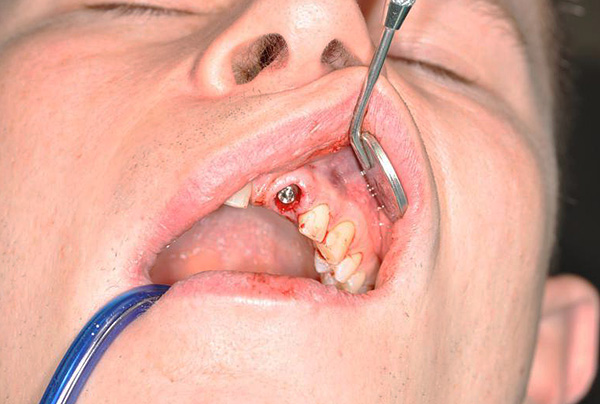
How to make implants last for decades?
The conditions for implants to serve not 5–6 years, but 15–30 years are very simple: regular hygiene by the patient is important. It is necessary to brush your teeth twice a day, rinse your mouth after eating, remove plaque from enamel (even with artificial!), Do not abuse solid foods (do not chop nuts with your teeth) and be sure to visit a doctor at least once a year to monitor the condition of implants (if suddenly problems have been outlined - they can often be easily eliminated at the initial stage).
Do not forget about maintaining the overall health of the body.Exacerbation of chronic diseases (cardiovascular, hormonal, immune) can lead to rejection of established implants even with relatively good oral hygiene. In such cases, the "big" name, brand and cost of implants do not play a special role.
Remember that implants (even as biocompatible as possible) require increased attention, because they are surrounded by living tissues, serious inflammation of which can ruin the whole picture and lead to rejection of non-living material.
Doctors' reviews and patient opinions on MIS implants
A description of any implant systems on paper can look very pretty. But the main thing is how they behave in practice. And here it is worth noting a simple and talking point - Israeli MIS implants both in Russia and abroad have for many years been one of the highest percent of sales.
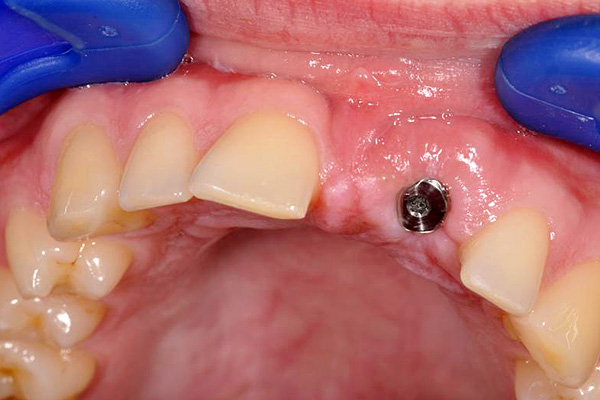
If they were often torn away, then no “democratic” price would allow achieving such high popularity.
Implantologists who work with MIS implants respond very positively to products and note their following advantages:
- ease of use - the kit includes all the necessary tools (keys, cutters, adapters) for installing implants. They allow you to create a hole under the implant quickly and without unnecessary loss of bone tissue;
- a wide range - the dimension of implants starts from 3 mm in diameter and 6 mm in length, so you can choose designs for different types and volumes of the patient’s bone, solving almost any clinical problem;
- the MIS implantation system is well compatible with the abutments and instruments of other Israeli manufacturers - in practice, this means that the patient can go to another doctor, and even if the implantologist does not work with the MIS system, he will be able to complete the implantation that has begun, correct or redo the work of his predecessor.
On the other hand, some implantologists note that MIS implants are not made from pure titanium, which increases the risk of structural rejection and allergic reactions. In addition, the presence of a threaded neck is a relatively outdated technique, the use of which in some cases can lead to excessive accumulation of plaque, the appearance of gum disease.
However, for the most part, implantologists agree that in the competent hands of a doctor, both budget and premium models of implants are likely to serve the patient perfectly for several decades.
The cost of dental prosthetics on Israeli MIS implants
As noted above, MIS dental implants are among the most affordable. The cost of installing one implant (excluding the cost of the prosthesis) will be from 15-18 thousand rubles, depending on the clinic. If we talk about turnkey implantation, then the cost of treatment will be from 25 thousand rubles and more (will largely depend on the cost of the crown).
To summarize, we can say that MIS implants belong to the middle price category, they are really created using a complex of modern technologies, they have a rather high percentage of engraftment even in difficult clinical cases. And importantly, they are common in Russian clinics, that is, it will not be difficult to find a doctor who works with them.
An example of a simultaneous installation of the MIS implant (that is, immediately after tooth extraction)
Which dental implants are better - comments of the implantologist

